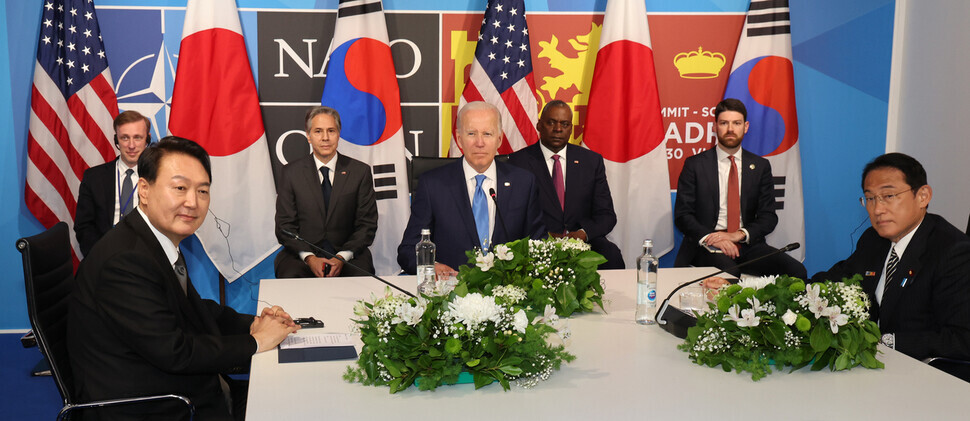hankyoreh
Links to other country sites 다른 나라 사이트 링크
S. Korea, US, Japan vow to bolster cooperation on N. Korean nukes, missiles

During a summit in Madrid, Spain, on Wednesday, the leaders of South Korea, the US and Japan agreed to expand cooperation based on democratic values and deliberate closely on ways to enhance the level of trilateral security cooperation in response to North Korea’s nuclear weapon and missile programs.
Given reports that North Korea is about to carry out a seventh nuclear test, South Korea, the US and Japan are expected to work together to ratchet up pressure on the North.
South Korean President Yoon Suk-yeol met with US President Joe Biden and Japanese Prime Minister Fumio Kishida for 20 minutes at the IFEMA Convention Center in Madrid on Wednesday.
In the opening remarks before the meeting, Yoon said, “[North Korea’s] nuclear and missile threats continue to evolve, and the global landscape is facing increased uncertainties, thereby rendering our trilateral partnership all the more significant. I hope that our meeting today will position the [South Korea]-US-Japan partnership as yet another central pillar for global peace and stability.”
Biden remarked on the great importance of “our shared objective, including a complete denuclearization of the Korean Peninsula and a free and open Indo-Pacific,” and said that “we remain deeply concerned at [North Korea’s] continued [. . .] potential [. . .] to conduct a nuclear test” while reaffirming the US’ commitment to defending South Korea.
“In the case a nuclear test is performed [by North Korea], I hope that response can be taken at the trilateral level, including joint exercises. In order to strengthen the deterrence and response capabilities of our alliance with the US, Japan will fundamentally reinforce our defense capabilities,” Kishida said.
After the meeting, the presidential office said that Yoon, Biden and Kishida had agreed to strengthen security cooperation and described the North Korean nuclear issue as a shared concern that urgently requires a response from the three countries. The last time the leaders of the three countries met was in September 2017, nearly five years ago.
“The North Korean nuclear issue is a common task that demands an urgent response from South Korea, the US and Japan. I think our three countries should make a firm and principled response to North Korean provocations while also cooperating closely on bringing North Korea to the table for talks,” Yoon proposed during the meeting.
“I think that further advances in the North Korean nuclear program will lead to South Korea, the US and Japan gradually strengthening their security cooperation,” Yoon said during a meeting with reporters prior to the summit.
The three leaders also agreed to increase cooperation based on the shared values of liberal democracy. They spoke of agreeing on the urgent need for their three countries, which share fundamental values such as liberal democracy, human rights, and the rule of law, to cooperate in responding to the regional and global issues confronting them.
The reference to “sharing fundamental values” would appear to exclude China. It also may indicate that South Korea’s foreign policy focus will shift toward the US and Japan, which are prioritizing the containment of China.
The fact that Yoon had earlier attended a summit with NATO’s four Asia-Pacific partners (South Korea, Japan, Australia and New Zealand) suggests that Yoon means to join those countries in their attempt to keep China in check.
Yoon reportedly asked the leaders of NATO allies and partners for their cooperation in North Korea’s denuclearization during a three-minute speech at the NATO summit, which was held after the South Korea-US-Japan summit.
The previous day, White House national security advisor Jake Sullivan said, “North Korea adjusts its methods of acquiring revenue constantly. And so we need to constantly be looking for ways to cut off those new sources of revenue.”
By Kim Mi-na, staff reporter
Please direct questions or comments to [english@hani.co.kr]

Editorial・opinion
![[Editorial] Penalties for airing allegations against Korea’s first lady endanger free press [Editorial] Penalties for airing allegations against Korea’s first lady endanger free press](https://flexible.img.hani.co.kr/flexible/normal/500/300/imgdb/original/2024/0502/1817146398095106.jpg) [Editorial] Penalties for airing allegations against Korea’s first lady endanger free press
[Editorial] Penalties for airing allegations against Korea’s first lady endanger free press![[Editorial] Yoon must halt procurement of SM-3 interceptor missiles [Editorial] Yoon must halt procurement of SM-3 interceptor missiles](https://flexible.img.hani.co.kr/flexible/normal/500/300/imgdb/child/2024/0501/17145495551605_1717145495195344.jpg) [Editorial] Yoon must halt procurement of SM-3 interceptor missiles
[Editorial] Yoon must halt procurement of SM-3 interceptor missiles- [Guest essay] Maybe Korea’s rapid population decline is an opportunity, not a crisis
- [Column] Can Yoon steer diplomacy with Russia, China back on track?
- [Column] Season 2 of special prosecutor probe may be coming to Korea soon
- [Column] Park Geun-hye déjà vu in Yoon Suk-yeol
- [Editorial] New weight of N. Korea’s nuclear threats makes dialogue all the more urgent
- [Guest essay] The real reason Korea’s new right wants to dub Rhee a founding father
- [Column] ‘Choson’: Is it time we start referring to N. Korea in its own terms?
- [Editorial] Japan’s rewriting of history with Korea has gone too far
Most viewed articles
- 1[Editorial] Penalties for airing allegations against Korea’s first lady endanger free press
- 260% of young Koreans see no need to have kids after marriage
- 3Months and months of overdue wages are pushing migrant workers in Korea into debt
- 4Bills for Itaewon crush inquiry, special counsel probe into Marine’s death pass National Assembly
- 5[Reporter’s notebook] In Min’s world, she’s the artist — and NewJeans is her art
- 61 in 3 S. Korean security experts support nuclear armament, CSIS finds
- 7S. Korea discusses participation in defense development with AUKUS alliance
- 8[Guest essay] Maybe Korea’s rapid population decline is an opportunity, not a crisis
- 9[Editorial] Yoon must halt procurement of SM-3 interceptor missiles
- 10Cracks found in containment building of UAE nuclear power plant built by S. Korean companies